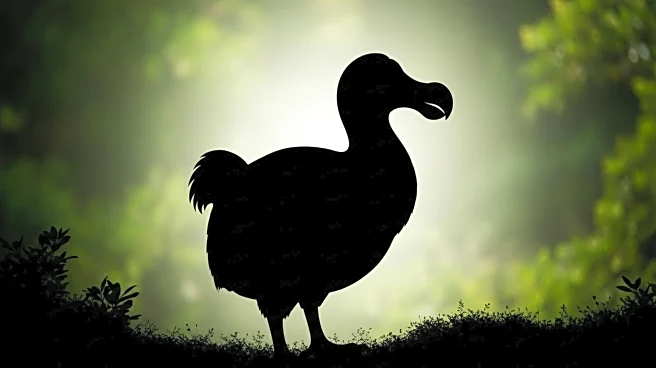What is the story about?
What's Happening?
Colossal Biosciences, a Texas-based company, has announced a significant breakthrough in its efforts to resurrect the extinct dodo bird. The company has successfully grown pigeon primordial germ cells, which are precursors to sperm and eggs, marking a pivotal step in bringing back the dodo, a type of pigeon extinct for over 300 years. The company plans to use gene-edited chickens as surrogates for the dodos, injecting them with primordial germ cells from Nicobar pigeons, the dodo's closest living relatives. This development is part of Colossal's broader de-extinction efforts, which also include plans to reestablish woolly mammoths and dire wolves. The company aims to create a genetically diverse population of dodos to reintroduce them into the wild in Mauritius, their former habitat.
Why It's Important?
The potential resurrection of the dodo raises significant ethical and environmental concerns. While Colossal Biosciences claims its technology could aid endangered species, critics argue that it diverts attention from pressing conservation issues. The revival of extinct species could pose a moral hazard, potentially enabling activities that lead to extinction, such as habitat destruction and climate change. Additionally, the introduction of gene-edited species into ecosystems could have unforeseen consequences, as these environments have evolved in the absence of such species. The debate highlights the complex intersection of technology, conservation, and ethics in modern science.
What's Next?
Colossal Biosciences plans to continue its research and development efforts, with a timeline of five to seven years for the potential reintroduction of dodos. The company is collaborating with wildlife groups to identify safe, rat-free sites in Mauritius for the dodos. As the project progresses, it is likely to face increased scrutiny from conservationists, ethicists, and the public. The company's activities may also inspire further discussions on the role of technology in conservation and the ethical implications of de-extinction.
Beyond the Headlines
The broader implications of de-extinction efforts include potential shifts in conservation priorities and the ethical considerations of 'playing God' with nature. The project could influence public perception of extinction and conservation, potentially leading to complacency regarding current environmental challenges. Additionally, the commercialization of de-extinction technology raises questions about the commodification of nature and the potential for profit-driven motives to overshadow ecological considerations.
















